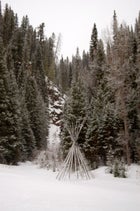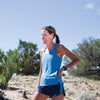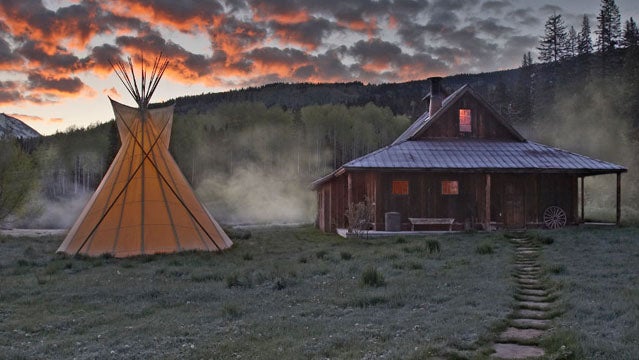My ear is ringing. Sometimes it sounds like a seashell, other times crickets, and right now like a car alarm, six blocks away. It started a couple of weeks ago when I was up on the mountain skiing with my girls, and hasn’t let up since. I can’t figure out what caused it. Maybe it was the altitude, or when I bent over to buckle the two-year-old’s boots for the 600th time in 10 minutes something got stuck inside. I’m trying to be Zen about it, but it’s hard not to be frustrated—and a little wigged—by the chorus of insects in my head.
Raising Rippers
Katie Arnold on family adventure and bringing up active kids. Snow times for Dunton’s decommissioned teepee.
Snow times for Dunton’s decommissioned teepee. “Camping” in January? All roads lead to Dunton.
“Camping” in January? All roads lead to Dunton.All told, it’s been a noisy start to the new year. Was it only a few weeks ago that I’d rashly declared sleeping outside my #1 adventure resolution for 2013? Through some stroke of unplanned luck, our family camped in all but three months in 2012, and I wanted to find out if deliberately sleeping out every month would make us happier and more grounded. Never mind that January is the coldest, and therefore hardest, month for camping. All great experiments require suffering and sacrifice. We’d figure it out.
But first I had to fix the ringing in my ear. I saw my doctor, who checked for other symptoms (none). I started going weekly to my acupuncturist, showed up at a networking event reeking of garlic from the tincture I’d squirted into my ear before leaving the house, and even tried “tapping”—a goofy-looking but kind of awesome stress-buster called Emotional Freedom Technique. I whined to a writer friend, who said she had it, too. “I ignore it!” she told me gaily. Like an old-fashioned phone without an answering machine, she just lets it ring.
In between my rigorous self-healing regimens, I worried about the Great Camping Experiment. It’s full-on winter in New Mexico in January, even down south. Where could we go close to home without freezing? The whole point of sleeping outside is to spend quiet time together in nature, away from distractions of the digital world, to lower the blood pressure of family life. Stressing out or traveling far at the last minute to go camping would defeat the purpose. It was a conundrum I couldn’t solve, not with the car alarm in my ear. Plus, I rationalized, aren’t there more important things to worry about than something so contrived as where to take our kids camping in January?
Then I remembered. Sleeping and living outside has solved almost every problem in our family: worry, stress, overscheduled days, temper tantrums, nighttime wakings, teething, grief. Camping is the cure. It has calmed us all down in the past—could it do it again? There was only one way to find out.
I started scrambling. I booked us in for a backcountry ski trip to the Spruce Hole yurt in southern Colorado in February, but there were no openings in January. I checked the long range forecast for southern New Mexico—still frigid. I needed something close, and soon. Then I remembered that the backcountry lodge at Dunton Hot Springs, south of Telluride in Colorado, has a teepee. I called them up. “The teepee gets taken down in the winter,” the manager told me. “It can’t bear the snow weight.” But they have a new tent cabin, she told me: canvas walls and a load-bearing timber roof, 22 miles up a forest road in the San Juan Mountains. We were in.
is an old gold-rush ghost town. Built in 1886 to house miners, the town swelled to a few thousand people in 1905; by 1915, it had been abandoned. Set on the West Fork of the Dolores River, with its own natural mineral hot springs, the town site served as a wilderness retreat on and off until 1994, when a German skier came to Telluride on holiday and decided to drive over the mountains to have a look at a derelict ghost town. He bought the whole place, and started renovating.
It took seven years to restore Dunton’s 13 buildings and transform the town into a five-star wilderness resort. The mining cabins were in terrible shape: collapsing roofs, broken windows, sloping walls—and everything coated in a century’s worth of dust and grime. Nearly all building are original to Dunton; a couple were rescued from other ghost towns of the same era, like the Pony Express building that was moved in from Montana and now houses the spa and yoga studio. Butch Cassidy—the Butch Cassidy—carved his name in the bar in the saloon, which now serves as the resort’s dining room and lounge.
Nowadays, you can hole up in Dunton year-round, hiking 14ers in the summer, heli-skiing from your front door in winter, casting for trout in the Dolores, and soaking in 104-degree magnesium and iron springs. You can take over the place for weddings or retreats, bring the kids, or escape with your spouse. And the whole time you will be plied with gourmet, organic, three-course meals, free-flowing cocktails, and wine made of grapes grown in Dunton’s own vineyard, Down Valley.
No question, this would be the fanciest “camping” we’d ever do. But would it count? And did it even matter? There’s not exactly a panel of “camping” judges—my own loose interpretation of the term would have to do. In the hierarchy of such things, sleeping in a tent on an extended backcountry trip is by far the best, but car camping qualifies, too. When it’s too cold, backcountry yurts or huts are definitely legit. Teepees? Yup. Even an old Airstream trailer will work in a pinch, as long as it’s not parked in the driveway. The important thing is to be outside together for at least a couple of days, in nature, away from home and all its digital distractions.
Camping is kind of like drinking water: By the time you feel thirsty, they say, you’re already dehydrated. When it seems too stressful to plan a camping trip, well, that’s a pretty sure sign it’s time to go. What had started out as a lark—12 months of sleeping out in nature—now seemed non-negotiable. A weekend in a tent/cabin at Dunton, in the silence of the San Juans, with only a handful of other guests and no cell reception, might be exactly what the doctor ordered.
With only a week to spare on the January calendar, we set off to find out.


